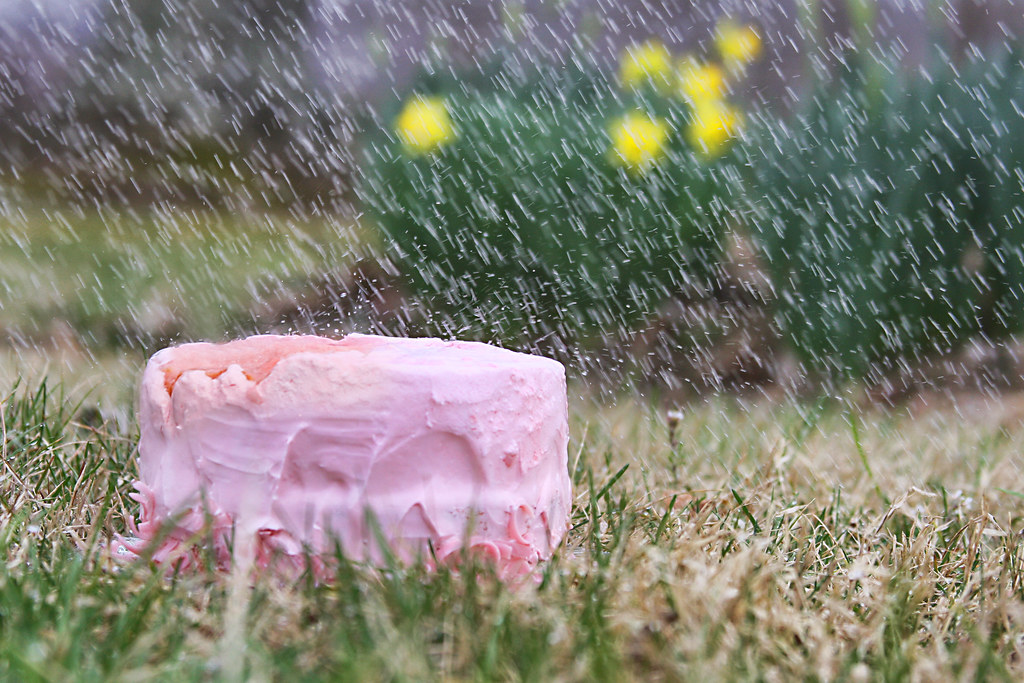I have had a request! My friends & I were talking about 2017, and how we hoped it would be better than 2016 in many ways. One of our number, Kalonice, knocked on the table for good luck. Then she said, "Where does that come from, knocking on wood?" Naturally, I had to find the answer.

(Image from Woman's Day)
Before I do any research, I'm going to put forth a guess. I'm going to say it has something to do with touching the wood of the crucifix.

One rendering of what a tree spirit might look like.
(Image from Tana Hoy)

Someone left the cake out in the rain -- not just bad but also bad luck.
(Photo by Doris Rapp on Flickr)

Either Jack proves the German lore wrong, or that door is not made of oak. This seems especially creepy, though, knowing that knocking wood is supposed to keep the badness away, and here the bad guy is doing it, wanting to be let in so he can bring about more badness.
(The Shining gif from Metro News)

Really going for the good luck, or touching wood all the way around the tree, hoping that 2017 will be better than the auguries currently show.
(Photo posted by Shouvik Chatterjee at Quora)
Sources
Mental Floss, Why Do We Knock on Wood?
Today I Found Out, Why Do We Knock on Wood?
The Phrase Finder, Knock on wood
Metro News, Why do we touch wood to avoid bad luck?
Touch Wood for Luck, The History & Superstition of "Touch Wood"
Islam in Everyday Arabic Speech, page 115

(Image from Woman's Day)
Before I do any research, I'm going to put forth a guess. I'm going to say it has something to do with touching the wood of the crucifix.
- I am wrong! The custom goes back way before Christianity.
- As with many of our traditions that have been around for a very long time, no one can say with certainty what is the exact timing or origin of the practice. But it goes all the way back to pagan times when Europeans -- perhaps the Druids or the Greeks -- believed that spirits lived in trees.

One rendering of what a tree spirit might look like.
(Image from Tana Hoy)
- So when you spoke of your hopes for good luck, you'd touch or bang on the trees or the wood of your house or whatever wood was near to hand from which the spirits might spring. Researchers think original idea was possibly that you were asking the spirits to make this good luck wish come true. Or maybe you were acknowledging that they are in charge, and knocking on their wood is like saying, "Hello, I know this is up to you, so I hope you'll allow this wish to come true."
- Over time, the tradition got co-opted by the non-pagans. Christians began saying that knocking on wood was a way of saying, This is up to Jesus, so I'm going to knock wood which reminds me of the crucifix. So I was kind of right, but there was a more-right answer that came first.
- At some point, the idea must have changed from propitiating the tree gods or essentially praying to Jesus to give you good stuff and became a superstition that tried to keep evil-minded spirits from bringing you bad luck. Around the 17th century, when people said "knock wood" (or in Britain, "touch wood"), they would add the Latin phrase "absit omen," which means "may the omen be absent from me."
- Keeping away the bad luck seems to be the prevailing attitude today, so much so that I'm tempted to disagree with the researchers and bet that this might have been the idea from the beginning. Lots of societies hold the idea that if the spirits find out that you have too much good luck, they'll foul things up for you. You know how this goes. As soon as you think everything's cake, something drops out of the sky -- or maybe from the treetops -- and wrecks your cake.

Someone left the cake out in the rain -- not just bad but also bad luck.
(Photo by Doris Rapp on Flickr)
- Here are similar expressions in other languages. In some countries, the expression is meant to ward off evil spirits, and in others, it is meant to seek the protection of the good spirits.
- Arabic: امسك الخشب (imsek el-khashab), means knock wood, but gets translated as "God is the Protector"
- Brazilian Portuguese: bater na madeira
- Czech: klepat na dřevo
- Finnish: koputtaa puuta
- Greek: chtipa xilo
- Swedish: ta i trä
- German lore has it that the devil can't touch oak, so if you knock oak, you're proving that you aren't the devil.

Either Jack proves the German lore wrong, or that door is not made of oak. This seems especially creepy, though, knowing that knocking wood is supposed to keep the badness away, and here the bad guy is doing it, wanting to be let in so he can bring about more badness.
(The Shining gif from Metro News)
- There's also a story from Jewish history. When they were being persecuted during the Spanish Inquisition in the 1490s, the Jews were hiding in synagogues and temples, which were made of wood. They devised coded knocks to indicate they weren't the bad guys so their fellow Jews would let them in. Knocking on wood was a thing that helped them, resulting in good luck.
- I don't know if I buy this story because the only places where I've seen it recounted are on sites that don't have a Jewish focus. Sites maintained by people with a Jewish background say it's a Christian practice that they've adopted.
- So while it's hard to say exactly when the practice started, and while some cultures mean it to keep the bad stuff away and others mean it to bring the good stuff, what does seem to be true is that cultures & languages throughout time and around the globe knock wood.
Really going for the good luck, or touching wood all the way around the tree, hoping that 2017 will be better than the auguries currently show.
(Photo posted by Shouvik Chatterjee at Quora)
Sources
Mental Floss, Why Do We Knock on Wood?
Today I Found Out, Why Do We Knock on Wood?
The Phrase Finder, Knock on wood
Metro News, Why do we touch wood to avoid bad luck?
Touch Wood for Luck, The History & Superstition of "Touch Wood"
Islam in Everyday Arabic Speech, page 115
best hug day quotes for her
ReplyDeletepropose day quotes for friends
valentines day messages for kids
teddy day romantic messages
ReplyDeleteThanks for posting such informative and valuable blog post so keep posting and update us.
New Business Ideas and Tips
Effective SEO Strategies 2020
10 Digital Marketing Trends
Content Marketing
بالتوفيق اعمال مميزة شارك اعمالنا تُعد الخيار الأمثل لكل من يسعى لتحسين جودة حياته المنزلية من خلال خدمات تنظيف شاملة تسليك مجاري محترف، ومكافحة فعالة للحشرات شارك اعمال شركة تسليك مجاري بسيهات التزامها بالجودة والاحترافية يجعلها تبرز بين الشركات الأخرى ويضعها في مقدمة قائمة الخيارات لكل من يرغب في تحويل منزله إلى بيئة مثالية .
ReplyDelete